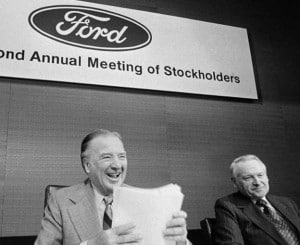
During a meeting of Detroit’s civic leaders, GM CEO Mary Barra said she was “impatient and disgusted” by the brutal treatment black Americans often face today.
The alleged murder of George Floyd at the hands of police while being arrested in Minneapolis last month has triggered sometimes violent protests across the United States, but also an outpouring of responses from religious, civic and business leaders – including the top executives of some of the country’s largest automakers.
In a message sent to General Motors’ employees, suppliers and dealers, CEO and Chairman Mary Barra said she was “impatient and disgusted” by the fact that black Americans continue to face such brutal treatment, adding that it is time for “meaningful, deliberate change.”
In a letter sent to global employees, meanwhile, Mike Manley, the CEO of Fiat Chrysler Automobiles said, “I emphatically reject the hatred and prejudice that still tears at the fabric of our society and which led to the death of George Floyd and so many before him.”
(If May car sales beat expectations, low rates likely cause.)
The U.S. auto industry has, in many ways, served as a living laboratory for social change. Some of the industry’s pioneers were openly racist, or worse. Henry Ford was an avowed anti-Semite whose newspaper, the Dearborn Independent, spent years publishing hateful editorials cited by Nazi leaders. His grandson, Henry Ford II, spent years making amends and was a strong proponent of the State of Israel.

FCA CEO Mike Manley told employees that he “emphatically rejected hatred and prejudice” black Americans still face.
Ironically, the auto industry provided some of the first opportunities for blacks and other minorities, many moving from the South to Detroit and other communities for work on assembly lines – though the Motor City remained one of the most segregated communities in the country, which fueled the explosive 1967 riots.
In recent years, Detroit’s automakers have made a push for greater inclusion, asserted Manley in his e-mail. “One of our key corporate values is inclusion, celebration of diversity and the absolute rejection of racism and bigotry, for me this goes beyond a corporate value, he wrote, adding that, “We have an obligation to celebrate the diverse culture of who we are, we owe it to our company but more importantly we owe it to ourselves.”
GM’s Barra was herself hailed as a sign of changing times when she took over as CEO in January 2014, the first female to lead a major automaker anywhere in the world. She has markedly increased not only the number of women but also of minorities, overall, in senior ranks at the company.
(May sales to drop as fleet sales collapse.)
But Barra said such steps are not enough. The nation, she said in her own e-mail, has major issues to, first, acknowledge and, then, to address.

Henry Ford II, left, spent much of his career making amends for his grandfather’s anti-Semitism and other prejudices.
“The recent deaths of George Floyd, Ahmaud Arbery and Breonna Taylor astonishingly add to the important and unconscionable list of black Americans who have lost their lives based on the color of their skin,” said Barra. “I am both impatient and disgusted by the fact that as a nation, we seem to be placated by the passive discussion of ‘why.’ Why does this happen? Why can’t we get to a different place? Why is the response so visceral?”
The events of the past week have triggered protests across the United States. In turn, there have been demonstrations around the world, huge crowds gathering outside American embassies in Canada, Germany and even Australia and New Zealand.
But FCA’s Manley stressed that, “Although we are seeing the rawness of this issue exposed in the United States, the scourge of racism and discrimination has no respect for international boundaries. As employees of one of the largest companies in the world,” he added, “we absolutely have the individual and collective power to make a difference.”
(FCA moves closer to full production in North America.)
If there is a positive side to what has happened over the past week, said GM’s Barra, it is that the issue of racism and police brutality can no longer be hidden. “Because awareness leads to dialogue … dialogue leads to understanding … and understanding leads to change.”
